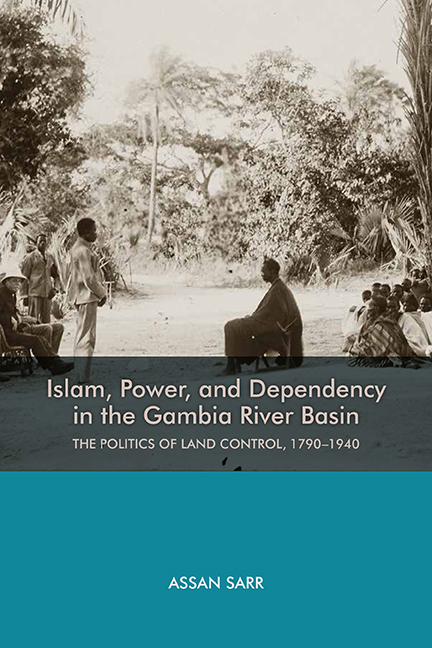Book contents
1 - The Founding of Mandinka Settlements
from Part 1 - The Period of Uncontested Soninke Dominance
Published online by Cambridge University Press: 26 April 2018
Summary
Origins of the Mandinka
The Mandinka are a group of agricultural peoples who speak one of the Mande languages and live in the heart of the savanna country between the upper Senegal and upper Niger rivers. By the time André Alvares de Almada visited the Gambia region in 1594, they were already firmly settled on both banks of the Gambia River, and by 1800, they provided the ruling class and most of the inhabitants of the region. However, their origins in the Gambia region are obscure. The most common explanation of their origins is that sometime before the thirteenth century small groups of Mandinka hunters, farmers, and traders moved west from their upper Niger River homelands and pushed across the western extension of the savannas of the Upper Guinea Coast. While in the area, they mixed with the indigenous population. In the thirteenth century, more immigrants moved into the region from the heartland of the Mali Empire. These Mandinka migrants founded several small states, and gradually extended their control over the Serer peoples and other groups.
Much of what we know about early Mandinka history comes from oral traditions, and many of the Gambian traditions speak to the themes of migration, conquest, conflict, land, and settlement. Mandinka oral traditions deal with two periods in the history of the Western Mandinka: those dating to the period of uncontested aristocratic rule, and those from the period after the aristocratic families had been weakened by the militant jihads of the nineteenth century and then colonial conquest. The traditions that focus on the pre-jihad era are mostly concerned with the period between the thirteenth century and the second half of the nineteenth century, and how warriors led successful military conquests, thereby creating states. These traditions also deal with events related to the migration of the Mandinka from the center of the Mali Empire, which the Mandinka refer to as tilibo. In Mandinka, tilibo means “the land of the east” (literally “where the sun rises”). The second category of Mandinka oral traditions include those dealing with the period after 1860, following the collapse of the state of Kaabu, which long dominated politics and society across parts of southern Senegambia. The traditions recounted in Gordon Innes’ 1978 collection on Kelefa Sanneh belong to this genre of Mandinka oral narratives.
- Type
- Chapter
- Information
- Islam, Power, and Dependency in the Gambia River BasinThe Politics of Land Control, 1790–1940, pp. 33 - 58Publisher: Boydell & BrewerPrint publication year: 2016

